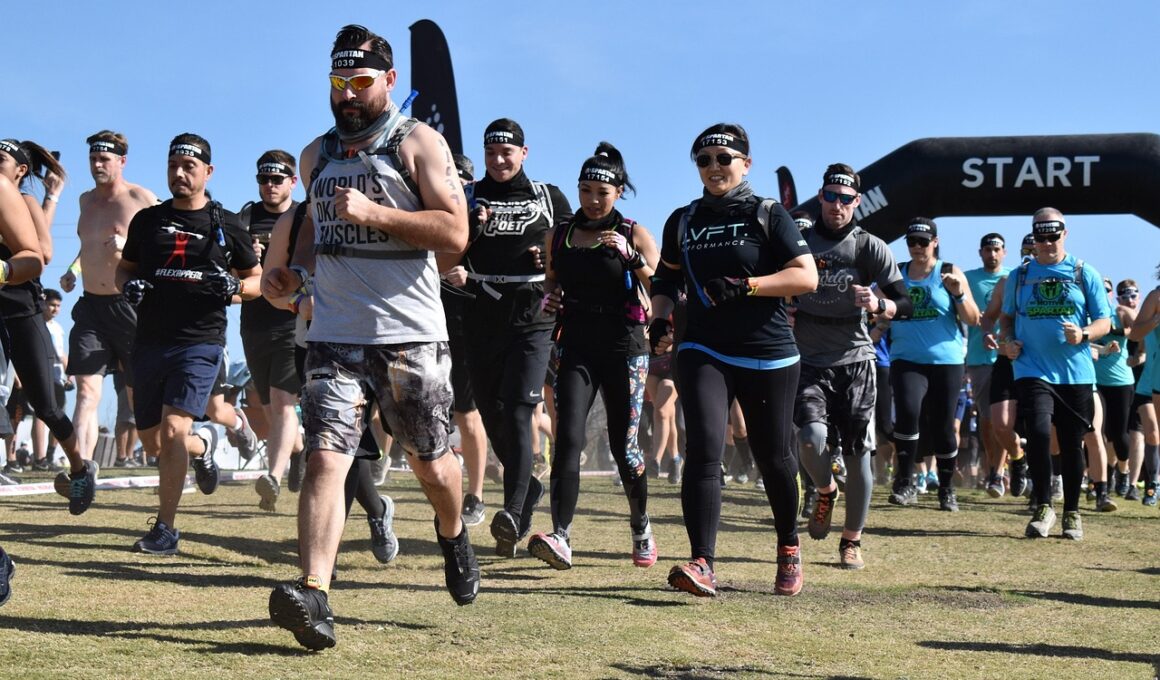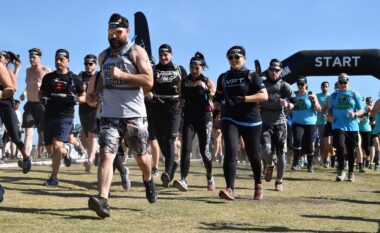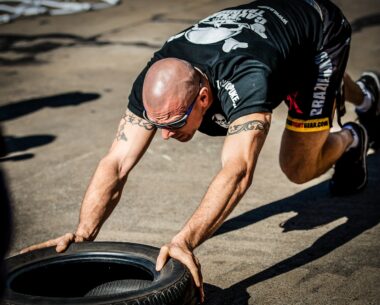10 Essential Functional Fitness Challenges to Boost Your Strength
Functional fitness challenges are dynamic exercises that enhance overall strength and performance. These challenges often focus on movements that mirror real-life activities, improving both physical capability and endurance. Incorporating such challenges into your workout routine can ignite motivation and yield substantial results. One of the most effective ways to build a robust fitness regime is through a series of progressive challenges. Engaging various muscle groups simultaneously ensures a comprehensive approach to training. As you tackle these challenges, focus on your form and breathing techniques; both are vital components for maximizing your gains. Additionally, it is essential to make adjustments according to your current fitness level and gradually introduce intensity. Whether perfecting a squat or conquering a set of burpees, the challenges you embrace should excite you while promoting personal growth. Experimenting with diverse functional fitness challenges can help you discover your strength limits while pushing you beyond them. Remember, improvement may not be instantaneous, but perseverance is key. Keeping track of your progress will also motivate you to continue enhancing your fitness journey. Have fun while challenging yourself and enjoy the process.
CrossFit style challenges can boost your functional fitness while also being enjoyable. These high-intensity workouts, characterized by strength training and aerobic exercises, can be adapted to meet various fitness levels. One popular CrossFit challenge is the “Filthy Fifty,” which comprises 10 different exercises performed consecutively. These include box jumps, kettlebell swings, and wall balls, among others. Not only do these exercises promote functional fitness, but they also increase stamina, coordination, and agility. Completing such a challenge can be quite rewarding, fostering a sense of community as individuals often join in groups. Whether you are a novice or an experienced athlete, you’re sure to feel accomplished after finishing the workout. It’s important to find your rhythm and pace as you progress through the exercises, emphasizing form over speed to prevent injuries. This balance allows you to maximize the benefits while still challenging yourself. If you’re looking for camaraderie, consider signing up for local competitions or group sessions. These gatherings often inspire individuals to push each other further and celebrate personal achievements. Remember to celebrate your victories, no matter how small, during this fitness journey.
Agility-Based Challenges
Agility is a crucial component of functional fitness that can be developed through various challenges. Engaging in agility exercises improves your coordination and quick reflexes, crucial for everyday activities. An example of an agility challenge is the cone or ladder drills that help cultivate faster foot movement and better stability. You set up cones in various patterns, sprinting from one to another to encourage directional changes. Such drills not only increase your agility but also raise your heart rate, contributing to improved cardiovascular health. You can monitor your progress by timing how quickly you complete the drills. Additionally, consider incorporating lateral movements into your workout regimen to further enhance your agility. These movements can involve shuffling, jumping, and other side-to-side actions. As you improve, increase the speed or complexity of the drills to keep pushing your limits. Training agility effectively requires focus and determination, both of which are developed over time through consistent practice. Ultimately, increased agility can vastly impact your overall strength and functional performance, reflecting improvements in your daily life routines.
Endurance challenges play a significant role in functional fitness, particularly for enhancing stamina. Engaging in endurance activities improves both cardiovascular fitness and muscular endurance. Examples of endurance challenges include running a set distance, completing a high-rep circuit, or rowing against the clock. Gradual progression is crucial; start with manageable distances or reps and then increase as your capacity grows. Using interval training is another effective strategy; it consists of alternating between high-intensity bursts and recovery periods. This method not only builds endurance but also keeps your workouts versatile and engaging. Ensure that you incorporate a variety of exercises to train different muscle groups. Consider adding bodyweight exercises like push-ups, squats, and planks for comprehensive endurance training. Tracking your progress will provide insights into your enhancement over time, encouraging you to stay motivated. Don’t hesitate to enlist a workout partner, as exercising together can foster accountability and make challenges more enjoyable. Hydration, nutrition, and adequate rest are equally crucial for recovery and sustained performance, enabling you to reach your fitness goals more efficiently. Ultimately, endurance challenges reveal the power of commitment and discipline in functional fitness.
Strength and Power Challenges
To build significant strength, incorporating power challenges into functional fitness is essential. These workouts exhibit a combination of strength training and explosive movements that enhance athletic performance. A classic power challenge involves Olympic-style lifts, which consist of the clean and jerk or snatch. These lifts can be complicated to master, so starting with lighter weights to focus on your technique is smart before progressing. Moreover, kettlebell swings provide an excellent alternative for developing strength through explosive hip movements. Power challenges not only build muscle but also improve coordination and control, making them essential for functional fitness. It’s advisable to perform these exercises with proper supervision, especially for beginners, to mitigate the risk of injury. Tracking your performance in weight lifted or repetitions completed can keep you motivated. Consider establishing personal records for various lifts or challenges to provide goals to strive for. Additionally, incorporating rest days into your routine is vital for muscle recovery. Remember, the journey to strength is gradual, and persistent efforts lead to greater success in your overall fitness pursuits. Enhance your performance by respecting the art of functional movement.
Flexibility challenges are vital components of a comprehensive functional fitness routine. Stretching not only provides numerous physical benefits but also reduces the risk of injury by promoting muscle recovery. A popular flexibility challenge includes incorporating yoga into your routine. Various poses help enhance flexibility while also fostering mental clarity and calmness. Another effective approach is to allocate specific sessions dedicated solely to mobility work, targeting areas that may be tight. Dynamic stretches like leg swings, arm circles, and hip openers prepare your body for workouts and improve overall range of motion. These techniques can heighten athletic performance by allowing better movement efficiency. It’s essential to listen to your body to avoid overstretching; flexibility training should not cause discomfort. Gradual improvement in flexibility signifies the success of your efforts. Measuring your flexibility gains can be accomplished through simple assessments such as touch-your-toe tests or splits. Incorporating breathing exercises into your flexibility routines can enhance the experience further. Remember that flexibility training complements all strength training regimens as it motivates functional movement patterns. Stay disciplined and make stretching a priority in your overall fitness plan.
The Importance of Recovery
Incorporating recovery challenges into your functional fitness routine ensures your body has the time to heal and adapt to the stresses of training. Recovery is often overlooked yet plays a crucial role in achieving your desired results. Prioritizing rest days into your program reduces the risk of injury and allows muscle rebuilding. The challenge here is to strike a balance between workout intensity and necessary recovery time. Listen to your body during this phase; if you feel overly fatigued or experience soreness, modify your training intensity accordingly. Techniques such as foam rolling, gentle movements, and adequate hydration during these recovery sessions improve blood circulation and ease muscle stiffness. Active recovery days may include walking, light jogging, or yoga, promoting movement while facilitating healing. Meditative practices can further contribute to mental recovery, allowing you to return to training rejuvenated. Maintaining a consistent sleep schedule is beneficial for recovery. Proper nutrition supports your fitness goals by providing vital nutrients during recovery. Don’t underestimate the power of rest; it’s during these moments your body strengthens and prepares for future challenges. Stay committed to your recovery process to maximize performance and maintain holistic well-being.
The overall journey in functional fitness is dynamic, filled with many challenges that promote growth and strength. Engaging in various fitness challenges enables you to assess your capabilities while providing insights into your strengths and areas for improvement. Setting realistic goals ensures you remain motivated and accountable throughout your journey. Consider documenting your progress in a fitness journal, tracking both physical and mental achievement. Utilizing technology such as fitness apps or devices can also provide additional motivation. It’s essential to find enjoyment in the challenges you undertake; exercise should be a fulfilling and rewarding part of life. Consider exploring group classes or community workouts to enhance motivation and foster camaraderie among people with similar goals. Be patient, as progress is often gradual and unique for everyone. Embrace the ups and downs along the way, knowing that consistency leads to lasting results. Establishing a sense of fun while pushing through challenges will make the process enjoyable and sustainable. Ultimately, functional fitness challenges amplify your overall strength, allowing you to lead a happier, healthier life.





